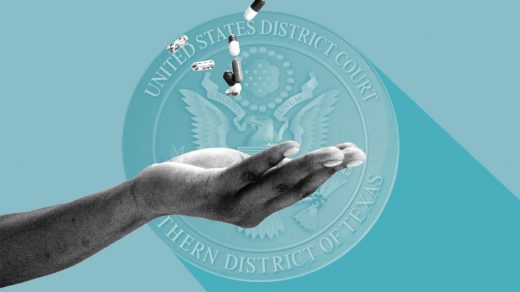Should your insurance cover PrEP? A judge’s ruling threatens access
By Naveen Kumar
The more-than-a-quarter-million Americans who use PrEP could lose free access to the HIV-prevention medication through their employer-sponsored health insurance, following a Texas judge’s ruling last week, which shot down a provision of the Affordable Care Act (ACA) requiring full coverage of preventive care. Absent the ACA mandate, patients would be subject to co-pays; PrEP can cost anywhere from $60 to $2,000 a month, with the cost of blood work and regular doctor visits on top of that.
The decision from U.S. District Judge Reed O’Connor in Texas, which blocks the federal government from enforcing the ACA mandate and took immediate effect across the country, has already proven broadly unpopular among patient-advocacy groups and the general public. It follows the judge’s controversial September ruling siding with a group of Texas employers, who argued that free PrEP coverage forced them to support services that “encourage homosexual behavior, prostitution, sexual promiscuity, and intravenous drug use” against their religious beliefs.
PrEP, which is 99% effective at preventing HIV transmission, is an essential part of the federal government’s initiative, announced in 2019, Ending the HIV Epidemic in the U.S (EHE). Indeed, the goal of the Department of Health and Human Services is to double the number of eligible people taking PrEP within the next 10 years, especially among those who are most at risk of infection, often because they lack access to adequate healthcare, including insurance coverage.
“Undermining access to PrEP takes away a critical tool for people who are at higher risk for exposure to HIV,” says Jason Cianciotto, vice president of communications and policy at Gay Men’s Health Crisis (GMHC), a New York City HIV/AIDS advocacy group. The risk for new HIV infection is over eight times as high among Black people, and nearly four times as high among Latino people, than it is among white people, according to CDC data.
“A ruling like this is part of the structural racism that has caused people of color to be among the group with the highest number of new infections,” Cianciotto says.
Women also account for one in 5 new HIV infections in the U.S., though three times as many men as women who are eligible for PrEP currently take it, a disparity health officials note is critical to address. Another case currently in Texas federal court could outlaw a leading abortion medication, the most common method for ending pregnancies in the U.S., part of a growing wave of threats to reproductive care since the overturning of Roe v. Wade.
Should people on private insurance plans lose free coverage for PrEP, Cianciotto predicts that “we’ll see a rise in transmission of not only HIV, but other sexually transmitted infections, and the continued stigmatization of people who take PrEP.” All of these consequences would lead to worse health outcomes for millions of Americans, and work directly against the federal government’s own initiative to increase PrEP uptake among those at highest risk of HIV infection.
Preventive care is in the best interest of insurance companies and employers, as much as for patients, because it curbs more costly care down the line, particularly in the case of chronic illness.
In a statement last week, Matt Eyles, president and CEO of AHIP, the trade group that represents health insurers, signaled that there are no immediate plans to curtail coverage. “Every American deserves access to high-quality affordable coverage and healthcare, including affordable access to preventive care and services that help avoid illnesses and other health problems,” Eyles said.
The federal government is widely expected to appeal the decision, and the Biden administration could pursue a stay of the ruling while the appeals process proceeds, though no announcements have been made.
Judge O’Connor has a history of beef with the ACA; in 2018, he deemed the entire legislation unconstitutional, a case that was overturned by the Supreme Court. His latest decision takes aim at one of the panels that advises the government about which preventive services to cover, deeming its authority invalid. That means all of the recommendations made by the United States Preventive Services Task Force since 2010 are on the chopping block, including free PrEP coverage, screenings for adolescent anxiety, and updated protocols relating to heart disease and a host of other conditions.
“We have a loud and monied minority, who, under the guise of protecting their individual freedom, are actually taking away the freedoms of a much larger group of people,” GMHC’s Cianciotto says. “The question that many of us are afraid to answer is, Where does it stop?”
(20)



